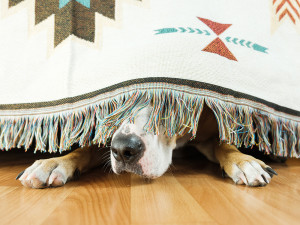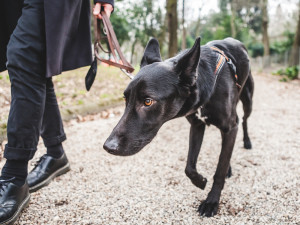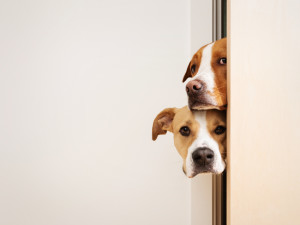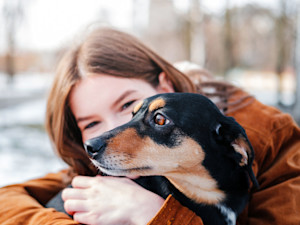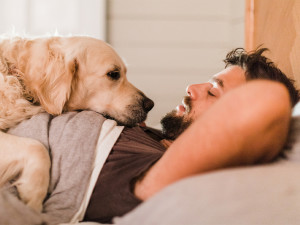Why Is Your Dog Hiding Under the Bed?
It must be comfy under there.

Share Article
If my dog Willy could hide under the bed in a thunderstorm, he would. Because the bed is too low, though, he hides under the bathroom sink, in my son’s closet and any tight space he can find. Willy, a Collie mix rescued as a puppy 11 years ago, is similar to many dogs who instinctively seek den-like spaces when they’re feeling anxious, stressed or unwell.
He tends to be more scared of loud noises than his littermate Lilac and retreats to the large stuffed bear wedged between the wall and the couch that he claimed as his bed years ago. The enclosed space gives him a sense of protection, reduces sensory stimulation, and helps him feel emotionally secure during times of overwhelm. There are plenty of people who can relate!
Dog trainer and educator Liz Gibbs, a former zookeeper at Six Flags Great Adventure Wild Safari and general manager at Woofie’s of Delray Beachopens in new tab, says dogs hide as a coping mechanism. “Some dogs have self-soothing coping mechanisms such as licking, chewing, or other similar behaviors and other dogs may hide,” Gibbs says. “Usually, this stems from being overwhelmed, overstimulated and unsure of what’s going on.”

Safety and comfort
Considering how dogs evolved, in close-knit packs that lived curled up together in dens, it makes sense they seek safety and comfort in the cave-like space under your bed when danger (real or perceived) threatens. Watch for signs of extreme distress, such as trembling or shaking, panting or whining.
Environmental triggers
Dogs are highly sensitive to loud noises, especially fireworks, thunder and firearms. Behavioral issues related to these environmental triggers such as hiding can be serious. Gibbs suggests investing in calming chews and sprays to help soothe your dog. Canine-specific earplugs and soft elastic bands that cover dogs’ ears help dampen sound.
Provide a safe space for your dog to relax, like a quiet room without windows. Relaxing music helps some dogs calm down. For more severe cases, Gibbs says a vet can prescribe medication such as trazodone or gabapentin that you can administer before a predictably loud event like the Fourth of July.
Thunderstorms
A German Shepard I used to live with tried climbing in the laundry hamper during thunderstorms. Why are dogs so afraid of thunder? Thunderstorms and fireworks rank high on the list of sudden loud noises that distress dogs.
Gibbs says the Fourth of July and New Year’s Eve can be especially stressful times for pups. Guns are triggering, too. “In addition to the loud bangs, dogs have an incredible sense of smell and the smoke and ash can cause them to panic, too. With thunderstorms, they can also sense the shift in the air pressure and become stressed,” Gibbs says.
Construction
If you’ve listened to a jackhammer for any length of time, you know it triggers stress. The cacophony of modern daily living — whether it’s construction, car alarms, smoke alarms, vacuums or loud music — is stressful for dogs because they have no context for it.
“It could be you move from a quiet suburban neighborhood to a busy city and your dog has never heard the hustle and bustle before,” Gibbs says.
Family conflict
Gibbs says family conflict affects pets as well as people. “With a lot of fighting, it is not just the yelling that can scare pets and cause them to hide,” she says. “Humans give off different smells when angry, stressed or sad. Dogs are extremely perceptive to these subtle changes (even if we don’t notice them ourselves) and react accordingly.”
Stress and anxiety
Thunderstorms are an obvious reason for any dog to hide under the bed. Some dogs are also naturally more anxious than others. “This can be due to lack of socialization as a puppy, poor breeding, lack of training and environmental factors in the home,” Gibbs says.
If your pup is hiding under the bed for no obvious reason, Gibbs suggests finding a trainer or behaviorist to help your dog gain confidence, feel more secure and learn how to handle stressful situations. A trainer can help slowly build their confidence by giving them something to do (a job, exercise or training) and provide proper outlets for mental stimulation that help reduce anxiety, Gibbs says.
New pets
What triggers one dog might not trigger another, and triggers can happen when you least expect them, Gibbs says. “It could be that you bring home a pet bird and your dog is not used to the smell, sound and sight of a new animal,” she says.
Slowly introduce the new pet. If the new pet is a dog, seek a compatible personality and set up a “meet and greet” before bringing them home. Your dog might be so scared of the new addition they seek safety and comfort under the bed, Gibbs says.
Strange visitors
Some breeds — such as Shiba Inus, Chow Chows, Basenjis and Akitas — innately have more “stranger danger” than other breeds, Gibbs says. If they feel threatened, they react by hiding. “It is not uncommon for some dogs to prefer women or be scared of hats, umbrellas or other accessories a strange visitor might have on them,” she says.
Introduce new people slowly and let your dog approach them on their own terms. Let your dog sniff the stranger and have the stranger offer them a treat. “Be cognizant of body language and don’t push too much too soon,” Gibbs cautions. “It is OK if the dog chooses to not interact and is safer for everyone. Bites often happen if a dog is stressed and their warning signs of feeling uncomfortable are being ignored.”
Changing surroundings
Dogs appreciate routine and notice changes, such as a family member moving in or moving away and furniture being rearranged. A move can be especially upsetting. Being in new surroundings is always scary to pets, since they have to adjust to unfamiliar sounds and smells. Just like with people, they have to learn the layout of the new home and noises that come with it.
Having familiar scents (such as a blanket from the former home) can help them adjust better. “Treating everything as normal and going about your business helps pets gain confidence. Pets feed off of our energy so staying calm and confident helps your pets mimic your behavior!” Gibbs says.
Medical conditions
Gibbs, a former zookeeper, likes to remind dog parents that all animals communicate through body language, vocalization and behavior. Your dog’s body language provides clues to their health and explains unusual behavior. If they’re hiding under the bed and trembling or shaking, whining, panting and drooling, call your veterinarian.
“Knowing how to read your dog’s body language can give you clues as to how they are feeling. Oftentimes you can intervene before it escalates,” Gibbs says. “Ear and tail position can tell you a lot about what a dog is feeling, as well as their posture and eyes.”
Pain and vulnerability
In the wild, showing pain is considered a sign of weakness and makes an animal a target to a predator, Gibbs says. “Many animals have instinctively learned to hide pain signals as a means of protection,” she says. “However, sometimes pets will hide when they aren’t feeling well or are hurt. You should always consult a vet if your pet is acting abnormally, because ruling out pain is the first step to helping them feel better.”
Rest and recovery
My dog Willy retreats to his bear after a long walk. It’s not unusual for dogs to seek a quiet retreat after bursts of activity, a tendency that may sound familiar to some people.
Age
Older dogs are more prone to arthritis, joint issues and illness, which lends to feelings of pain and vulnerability that might trigger instincts to hide. “To protect themselves, they will often seek comfort in hiding,” Gibbs says.
Breeding and personality
Just like some people are more anxious than others, so are dogs. And some dogs, like Siberian Huskies, have a strong burrowing instinct that originated from the need to regulate their body temperatures in cold climates. Responsible breeding can mitigate undesirable traits.
“Reputable breeders perform not just health testing on their dogs, but also behavior and temperament testing,” Gibbs says. “They breed dogs that are confident and stable-minded. Irresponsible breeders — such as puppy mills and backyard breeders — often do no testing and breed simply for looks and profit. In some cases, negative behavior and personality traits can be passed down to the offspring.”
Small breeds
Dachshunds, terriers and some toy breeds were bred to burrow. It’s in their genes. You’re as likely to find them burrowing under the covers as hiding under the bed.
Anxious temperament
Anxiety is evident in dogs that pace and whine, engage in destructive behavior, lick their lips, pant and pull their ears back. Pet parents may ask, why is my dog anxious all of a sudden? In fact, anxiety may be innate. Action alleviates anxiety.
If your dog needs emotional support, build in more exercise and mental stimulation or consult a trainer or behaviorist for activities that might boost your dog’s confidence.
Rescue dogs
Most rescue dogs come from hard beginnings. Anxiety, and an accompanying urge to hide, may be natural to them. “With rescue dogs, their background is often unknown. Certain situations that trigger hiding might not be known to shelters and future adopters, and past experiences can influence behavior,” Gibbs says.
Be gentle with your rescue dog. Introduce them to new stimuli slowly so as to not overwhelm them and trigger fight or flight instincts that stem from self-preservation.
References
Carbone, Larry. “Do “Prey Species” Hide Their Pain? Implications for Ethical Care and Use of Laboratory Animals.” Journal of Applied Animal Ethics Research, vol. 2, no. 2, 14 Oct. 2020, pp. 216–236, brill.com/view/journals/jaae/2/2/article-p216_6.xmlopens in new tab, https://doi.org/10.1163/25889567-BJA10001opens in new tab.
Caroline, Carla, et al. “Autonomic, Endocrine and Behavioural Responses to Thunder in Laboratory and Companion Dogs.” Physiology & Behavior, vol. 169, 1 Feb. 2017, pp. 208–215, https://doi.org/10.1016/j.physbeh.2016.12.006opens in new tab. Accessed 14 Dec. 2023.
Okamoto, Kazuya, et al. “Factors Influencing the Development of Canine Fear of Thunder.” Applied Animal Behaviour Science, vol. 270, 1 Jan. 2024, p. 106139, www.sciencedirect.com/science/article/pii/S0168159123003118opens in new tab, https://doi.org/10.1016/j.applanim.2023.106139opens in new tab.
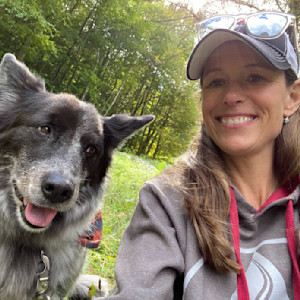
Catherine Fahy Green
Catherine Fahy Green is a journalist turned copy and content writer. As a pets writer, she focuses on and is fascinated by animal body language because there's so much to learn from and about animals by spending time in their presence and observing their physical cues.
Her work as a PR specialist appears in national trade media as press releases and stories about exciting new products people should try. She lives with her family in Western Massachusetts, where she listens closely to the stories her two dogs, flock of chickens, and four horses tell her. She spends her weekends at horse shows with her daughter.
Related articles
![Shiba Inu dog under a blanket, burrowing in covers]()
Why Do Dogs Burrow Under the Covers?
What’s behind the desire and whether it’s safe to do.
![Shy black dog walking with owner at the park.]()
How to Help an Anxious Dog Conquer Their Fears
Pro tips for boosting the confidence of a scaredy-cat dog.
![Two fearful adolescent dogs peeking through a slightly open door]()
Puppy Fear Periods: Why is My Dog Scared All of a Sudden?
Turns out, adolescence isn’t just tough for humans—it can be hard on dogs, too.
![Woman holding her scared dog outside.]()
5 Surprising Things That Dogs Are Afraid Of
And what to do when they go careening away from the Roomba.
![Man and golden retreiver laying on stomach looking at each other in bed]()
Dog Whimpering: Why a Dog’s Whimper Affects Us
To pet parents, a whimpering dog sounds as sad as a crying baby. Here’s why.
Why Does Your Dog Scratch the Carpet?
That is not a toy.

